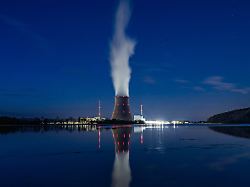Fight against CO2 emissions
Study: Nuclear power is simply too expensive
4/10/2023 6:36 am
When it comes to reducing CO2 emissions, nuclear energy is repeatedly brought into play as a substitute for fossil fuels. A study commissioned by the Greens now comes to the conclusion that this makes no economic sense.
Although nuclear power is controversial, it is said to be largely CO2-neutral. Because Germany wants to get rid of climate-damaging emissions as quickly as possible, some politicians see nuclear energy as a sensible alternative to coal, gas and oil. There is now talk of a further extension of the service life, and some have even called for the construction of new nuclear power plants. Researchers from the Technical University of Berlin and the German Institute for Economic Research (DIW) have now investigated whether this would make economic sense on behalf of the Greens in the Bundestag.
And in her study “Economic Aspects of Nuclear Power” they make a clear judgment: nuclear power is too expensive compared to other energy sources. “An overall assessment of the nuclear power system today yields the same result as in the last few decades: Even if external cost factors are neglected (…) the construction and operation of nuclear power plants is not economical, and there were and are cheaper alternatives.”
“Nuclear power was getting more and more expensive”
According to the authors, nuclear power was already one of the most expensive forms of energy in the 1950s, “almost six times more expensive than conventional energy at the time”. Safety requirements were still neglected at that time, and due to bad experiences with accidents, improvements were made in this regard in the decades that followed. The investment costs for nuclear power plants have therefore “not fallen over time, but rather increased”.
With regard to new construction projects, the researchers dismiss them: the few nuclear power construction projects in Europe and the USA are associated with considerable delays and cost overruns, such as at the Olkiluoto nuclear power plant in Finland or Flamanville in France. With these and others, “the investment costs incurred are many times higher than values that could theoretically result in economic profitability”.
Can only be financed with subsidies?
From the authors’ point of view, the continued operation of existing reactors is also not economically justifiable: Developments in the USA and France show that older nuclear power plants are not competitive with other energy sources and can only be kept connected to the grid through subsidies. In Germany, an extension of the term beyond mid-April 2023 would also have been “only possible if the commercial risks were nationalized.”
The study comes to the conclusion that nowadays renewable energies such as wind and photovoltaics are many times cheaper than nuclear energy. And not only the cost factor speaks against nuclear energy from the point of view of the authors: In view of the “urgency for decarbonization”, the time factor – with a view to the project delays in new construction projects – also has a negative impact.
So what’s left as an alternative? According to the study, model calculations show that “100 percent renewable energy systems are not only technically feasible, but also economically cost-effective”. However, Germany is currently still a long way from this target: According to the Federal Environment Agency, only around 20 percent of German final energy consumption was covered by renewable energies in 2022. Compared to the previous year, this is an increase of just 1.2 percentage points.
